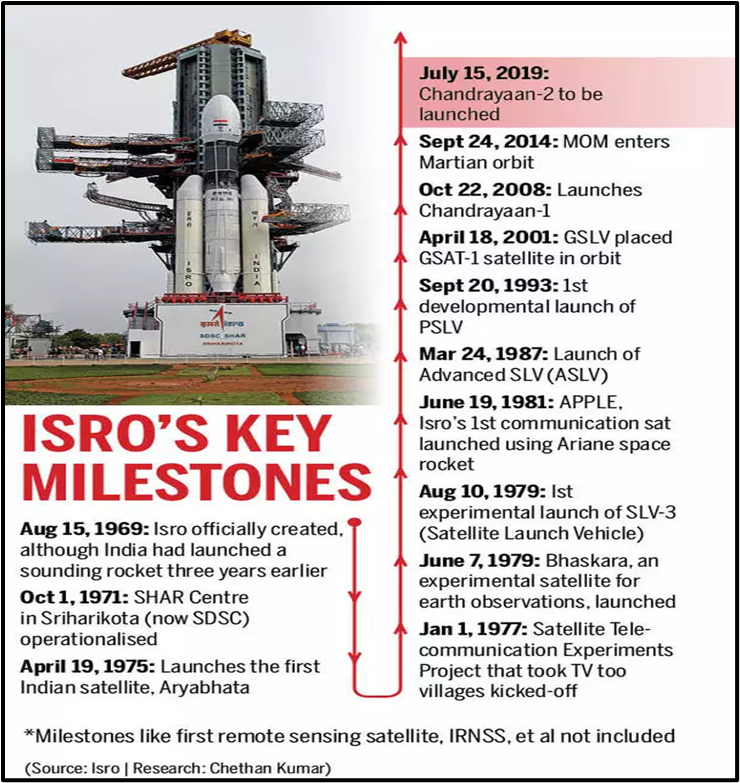Mains Daily Question
July 31, 2023
Indian Space Research Organisation (ISRO), has made significant strides in space exploration, satellite technology, and interplanetary missions. In light of this statement highlight how the ISRO’s missions have contributed to India's socio-economic development.
Approach:
Introduction: Introduce by giving a brief account of ISRO’s achievement and overall mandate.
Body: Highlight various sectors where ISRO has made an impact with examples.
Conclusion: Summarize the importance of ISRO in the nation’s development.
Answer:
From Aryabhatta to Gaganyaan ISRO has been spearheading the nation in space exploration and satellite technology and Interplanetary missions. ISRO has achieved remarkable milestones for India by revolutionizing communication, agriculture, weather forecasting, and disaster management through its satellite technology.
With a commitment to innovation and self-reliance, ISRO has significantly contributed to India's socio-economic development.
- Communication and Broadcasting: ISRO's satellite communication systems, such as INSAT and GSAT, have revolutionised India's telecommunication infrastructure. They have enabled remote and rural areas to be connected, offering better access to information, education, and healthcare services. Additionally, direct-to-home (DTH) broadcasting has expanded television reach, promoting media penetration and dissemination of information.
- Agriculture: Space technology has played a crucial role in agricultural development. ISRO's satellite-based remote sensing and imaging systems, like RESOURCESAT and RISAT, provide valuable data on soil moisture, crop health, and crop yield estimation. This information aids farmers in making informed decisions, optimising resource allocation, and mitigating the impact of natural disasters like droughts and floods.
- Rural development: Isro has launched Village resource centres (VRCs) to provide space-based services like tele-medicine, tele-education, panchayat planning etc.
- Education and outreach: EDUSAT have been used to enhance distance education, bringing quality learning to remote and underserved areas. YUVIKA programme is a special programme to impart basic knowledge on Space Technology to school children with a preference for rural areas encouraging more students to pursue Science, Technology, Engineering and Mathematics (STEM) based research /career.
- Weather Forecasting and Disaster Management: ISRO's meteorological satellites, including INSAT and Kalpana, have bolstered India's weather forecasting capabilities. Accurate weather predictions are crucial for agricultural planning, disaster preparedness, and early warning systems for events like cyclones and floods. ISRO's initiatives like the BHUVAN portal have been instrumental in minimising the loss of life and property during calamities.
- Navigation: The Indian Regional Navigation Satellite System (IRNSS), also known as NavIC, provides accurate positioning and timing information over the Indian subcontinent and surrounding regions. NavIC aids various applications, including transportation, logistics, fisheries, and disaster management. It reduces dependency on foreign navigation systems and enhances India's self-reliance in this critical technology domain.
- Earth Observation and Resource Management: ISRO's remote sensing satellites like CARTOSAT and IRS have facilitated comprehensive earth observation and resource management. They have been used for urban planning, forest monitoring, water resource management, land-use mapping, and environmental monitoring. These inputs aid policymakers and decision-makers in sustainable development and natural resource conservation.
- Space Exploration and Research: ISRO's missions to the Moon (Chandrayaan-1 and Chandrayaan-2) and Mars (Mangalyaan) have showcased India's capabilities in interplanetary exploration. These missions have advanced scientific knowledge, expanded India's international prestige, and opened opportunities for future collaborations in space research.
- National Security and Defence: ISRO's contributions extend to strengthening India's national security. Satellites like RISAT and Cartosat have been used for surveillance, border monitoring, and defence purposes, bolstering the country's security apparatus.
However, ISRO faces funding constraints, technological complexity, international competition and underdeveloped technologies (like cryogenics). Thus, increase in budgetary allocation, promoting interdisciplinary collaboration, fostering public-private partnerships, and streamlining administrative processes will enhance ISRO's capabilities to stay at the forefront of space research and yield even greater benefits for the country in the future.


